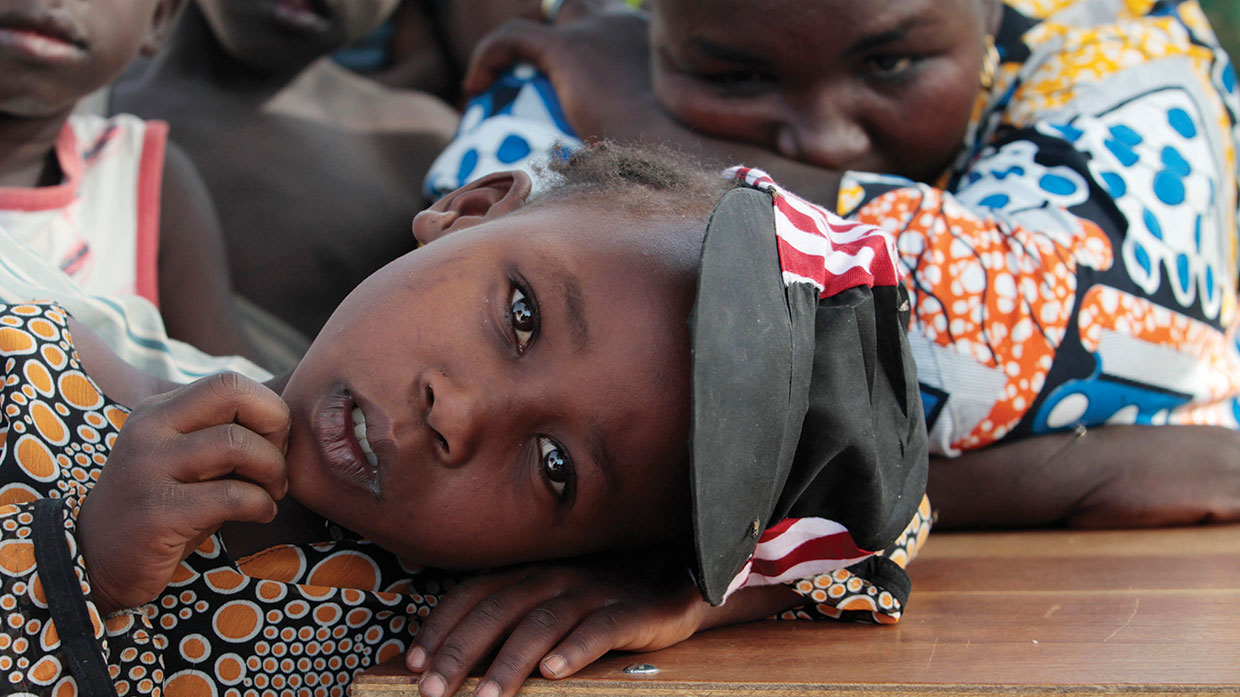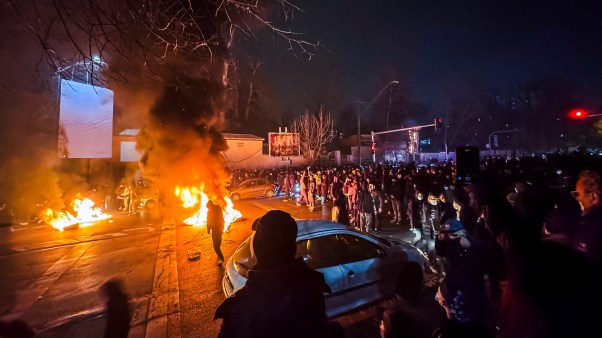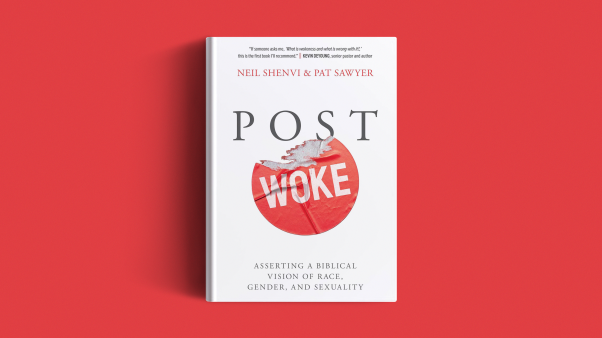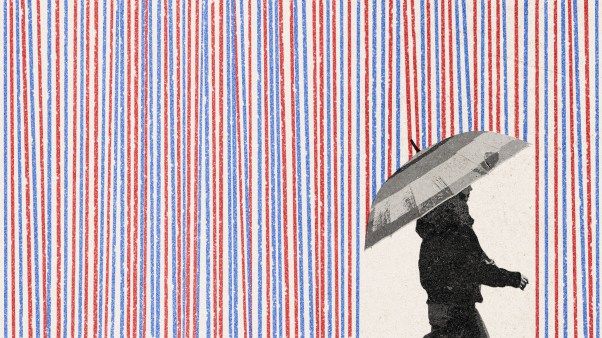At this month’s Evangelical Press Association convention, this article was awarded first-place recognition in the Cause of the Year (International Religious Persecution) category. Congratulations to Matt Woodley and Stewart Ruch III for this powerful story, exceptionally well told.
On January 7, 2015, two Islamist terrorists stormed into a small publisher's office in Paris and murdered 12 people. The world reacted swiftly and forcefully. Within a few days, an estimated 3.7 million freedom-of-speech sympathizers, joined by 40 world leaders, thronged the streets of Paris as a show of solidarity.
A few days earlier, some 3,000 miles to the south, the terrorist group Boko Haram swarmed into a small town in the northeast corner of Nigeria and slaughtered up to 2,000 villagers. Amnesty International called the attack "catastrophic." An eyewitness reported that the terrorists were killing people "like animals."
But the world hardly noticed.
It wasn't the first time the world offered a muted response to the violence in northeast Nigeria. In the last decade, often under the international radar, Boko Haram attacks and tribal conflicts (largely arising from land disputes between nomadic and farming communities) have killed thousands, displaced millions, and created a culture of orphans. The United Nations High Commissioner for Refugees Representative in Nigeria, Angele Dikongue-Atangana, said there were currently about 650,000 internally displaced persons in North East Nigeria.
Children Of Zambiri
But in the midst of this ongoing bloodshed, this past December, on a Thursday afternoon, we witnessed a slice of heaven breaking into northeast Nigeria. During a two-week partnership-building trip to Nigeria, Benjamin Kwashi, the Archbishop for the Anglican Church in Jos and his wife Gloria (or "Mama" as she's known), invited us to visit their home in the outskirts of their diverse and dynamic city four hours northeast of the Nigerian capital of Abuja. In the past decade, Jos has swelled with refugees from the ongoing conflicts. The Kwashis haven't just spoken out against the violence. They have adopted more than 60 children, gathering them into their home, a place known as Zambiri.
That's right—so far they have adopted more than 60 children. But don't use the word "orphan" around the Kwashis. If you do, a stunned Mama Gloria will ask, "Why would you call them orphans when they have a dad and a mom?"
The adoptions started with a trickle: a small school nearly 300 kilometers away was closing and 20 orphans needed a home. So Mama Kwashi brought them to Zambiri. A few weeks later, the Kwashis gathered in 10 more. In less the six months, they had 60 children, formerly orphans, living at Zambiri. Of course the Kwashis don't fund and staff this enterprise by themselves. Since they belong to a large diocese with many churches, the larger community has joyfully joined them in this incredible ministry of adopting and caring for the children of northeast Nigeria.
Most of the children had experienced unspeakable trauma. Here's one fairly typical "case history." After Laraba's father died of AIDS and her mother contracted AIDS, a man in her village raped and infected Laraba with HIV. She was only nine. Then her mother died, leaving Laraba to care for her seven-year-old brother, Bitrus. The siblings were shipped to a local orphanage where caretakers abused them again. When that orphanage closed, Mama Gloria gathered Laraba and Bitrus into her family at Zambiri.
The Kwashis have a simple ministry philosophy: Christ can heal the most profound trauma and loss, but that healing occurs in the context of a loving Christian community. More specifically, healing from trauma happens when broken people are immersed into a real Christian family, a place where a mom and a dad, an entourage of spiritual daddies and mamas, and a band of brothers and sisters embrace you with love and surround you with safety.
As Mama Gloria says, "Orphans' greatest needs are parents, parents, and parents. It was the loss of parents that made them orphans." And so for Mama Gloria the solution is simple: root them in a new family with a mom and a dad.
Six Fierce Mamas
That's exactly what we saw on that Thursday afternoon in Jos. Rev. Mark Mukan, our friend and host from the Anglican Diocese of Jos, told us we were going to Zambiri for a barbeque dinner in honor of the children. We expected a party to break out (Nigerian believers know how to dance and sing despite the most profound suffering and persecution), but we weren't expecting to attend the most amazing prayer meeting we've ever seen.
When Mark Mukan invited us to the back of the house, we saw the entire Kwashi clan on the back patio. All 60 children, ranging in age from two to twenty-two, were sitting on white plastic chairs in four long rows as a long line-up of Nigerian and American speakers stood before them and preached, taught, or brought greetings.
First, the children listened to a team of six Nigerian spiritual mamas, pastors' and bishops' wives who had come to preach and pray for the children of Zambiri. Then both of us gave a short greeting and biblical word of encouragement. A few more visitors spoke. Some of the children listened attentively; others started to slump in their chairs; some, clearly bored with too many greetings, stared off into the open blue sky. At first it looked like a typical information-overloaded, prolonged Sunday school class.
Then something remarkable happened. One of the Nigerian mamas walked to the children, sat down, and quietly said, "Children, if any of you saw your parents—your mommy, your daddy, or both—get murdered before your eyes, I want you to come forward for a special time of prayer. Don't be afraid, just come now. Come to these mamas who are waiting for you and we will pray for you. We will surround you and love you. Come now."
"Children, if any of you saw your mommy, your daddy, or both get murdered before your eyes, I want you to come forward for a special time of prayer."
All 60 children sat like stones in their white plastic chairs. They didn't look bored; they just looked dazed and numb. We looked at each other with bewilderment. Later that night as we debriefed, we both had the same initial reaction. Of course they're sitting like stones. Why would any child come forward in front of all these visitors? Imagine the social shame. Imagine the traumatic memories. This won't work.
But that mama didn't budge or back down. She sat and waited, looking upward and quietly singing as if in a trance. After a minute of awkward stillness, a ten-year-old girl got up from her chair and walked straight to that mama and collapsed in her arms.
As that girl burst into sobs, another girl rose from her chair and came forward. Then a twelve-year-old boy. Within less than a minute, at least 20 children had made their way forward—20 children who had watched their parents get murdered.
As the children wept and sobbed, some standing and some crumpling to the hard ground, those mamas encircled them like six fierce lionesses encircling their cubs.
A few of the women threw themselves on the ground and started sobbing and howling even louder than the children. They implored the God of heaven to look and see these traumatized children. Over and over all six of them called on the name of Jesus to bring his healing love. They asked the Spirit to tear open the heavens and descend with power.
With brutally raw emotions, those six mamas wept and called out to God with a cacophony of pent up prayers.
We had never seen anything like this. After growing up in an emotionally reserved northern Minnesota culture, I (Matt) felt awkward with the emotional intensity. The intense noise unnerved me. I (Stewart) have participated in hundreds of healing prayer meetings over the past 25 years, but I've never seen anything like that. Those mamas were pouring out holy mother-love and the children were drinking it all into their souls.
We can't remember how it stopped. But suddenly all was calm. There was a hush, a stillness. The women quietly stood up and embraced each of the children, gently wiping their tears. Then the children went and sat down in their orderly rows of white chairs.
No Longer Unspeakable
No one pretended that this was the last word on healing those children's traumatic memories. Those mamas didn't act like this prayer meeting filled the gaping chasm of grief and loss. It was only one small step in a long journey towards wholeness—but it was a crucial step.
Judith Herman, professor of clinical psychiatry at Harvard University Medical School and author of Trauma and Recovery, has noted how often our society tries to push aside the deep wounds of the traumatized.
Dr. Herman writes, "The ordinary response to atrocities is to banish them from consciousness. Certain violations of the social compact are too terrible to utter aloud: this is the meaning of the word unspeakable." In other words, because we can't handle the pain of the traumatized, we banish their wounds—and them, too. But Herman adds, "Atrocities, however, refuse to be buried…. Remembering and telling the truth about terrible events are prerequisites both for the restoration of the social order and for the healing of individual victims."
That explains at least part of the role of those spiritual mamas. As they allowed the children to come forward and acknowledge their horrific losses, as they allowed them to weep and sob, and as the mamas fell on the ground and wept with and for them, they were sending a clear message: your atrocities will not be banished here. Your atrocities will not remain unspeakable here. We will let you tell us about the terrible events that have befallen you, and as we hold you, we will bring you to Jesus, the Healer of the brokenhearted.
Notice that the atrocities were spoken, named, and publicly uttered not just in a counselor's office. They were brought into the light in the presence of Jesus and his new family—the church. And that is the true beauty of Zambiri. We had witnessed a dramatic, emotional, public outpouring of grief and compassion. But at Zambiri every single day is filled with an outpouring of love. Every single day, often through hundreds of mundane and private acts of love, the Kwashis provide what moms and dads have always provided—three meals, clothes, medical care, schooling, a safe place to sleep, and lots of hugs. They also have given them a new name—they are all "Kwashi kids."
The Sun Sets On Zambiri
The long prayer meeting was almost over, but the children still had one request: they wanted to pray for us. So one of the older girls stood before the entire crowd and announced, "Bishop Ruch, you have come a long way from America and we know you are a new bishop with a very big job, so we want to pray for you. Please kneel so we may pray." So I knelt on the hard ground of Zambiri and 60 children engulfed me and laid (or tried to lay) their hands on my back. The Kwashis have taught them well. Like the six fierce mamas, the children also cried out to the God of heaven to notice one of his American servants. In the midst of profound trauma, the Kwashi kids didn't just want to receive prayer; they wanted to offer a blessing to us.
Then as the prayer meeting slowly wound down and as the sun started to set over the Nigerian horizon, we heard loud music cranking up from another part of the Kwashis' compound. Now it was party time. Atrocities had been brought into the light. Tears had been shed and dried. Children formerly known as orphans had been adopted and loved.
Jesus was overwhelmingly present and powerful to heal. So the Kwashis fired up the barbeque and we ate, and danced, and sang, and played soccer, and danced some more. And the world hardly noticed, but to paraphrase Jesus, "We had to celebrate for these sons and daughters of mine that were lost and abandoned have found salvation and a new family. Let us rejoice and make merry." LJ
Stewart Ruch III is the Bishop of the Anglican Diocese of the Upper Midwest and senior pastor of Church of the Resurrection in Wheaton, Illinois.
Matt Woodley is missions pastor of Church of the Resurrection in Wheaton, Illinois.
Copyright © 2015 by the author or Christianity Today/Leadership Journal. Click here for reprint information on Leadership Journal.










